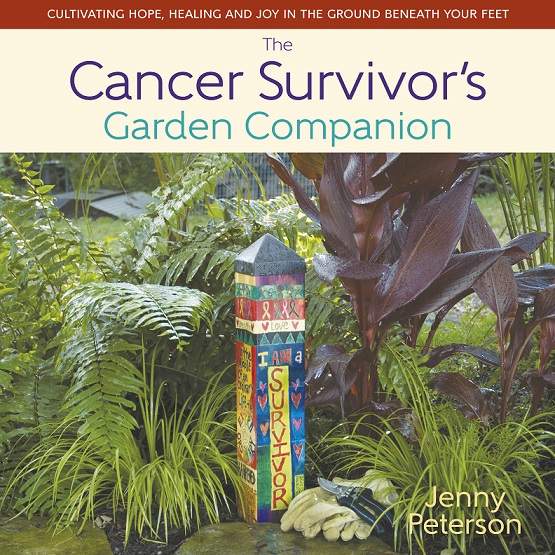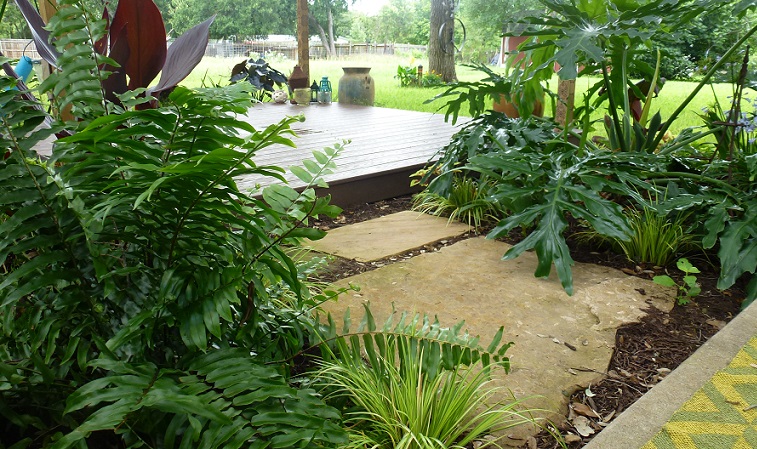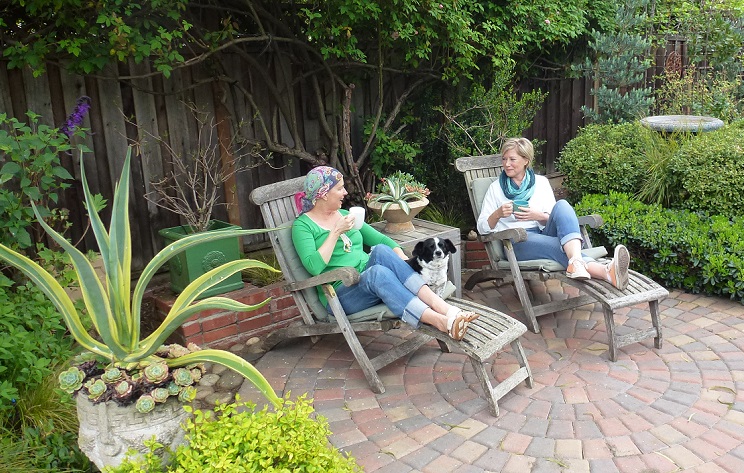Read This: The Cancer Survivor’s Garden Companion
I am not a cancer survivor, nor do I (as far as I know, and with a superstitious knock on wood) have cancer. Therefore, I’m not the target audience for my friend and fellow Austinite Jenny Peterson’s latest book, The Cancer Survivor’s Garden Companion: Cultivating Hope, Healing and Joy in the Ground Beneath Your Feet, which was published earlier this year by St. Lynn’s Press.
And yet as I read it, I found it spoke powerfully to me anyway — of finding peace and a sense of hope in one’s garden when life takes an unexpected and unwelcome turn. Without going into detail, I’ve endured a heartsickness of my own for about a year, and while I don’t compare it to the terror of a cancer diagnosis, it has at times been black. Jenny’s matter-of-fact acknowledgement of the wear-and-tear that fear and worry can cause to mind, body, and spirit resonated with me, and I resolved to put into practice some of her suggestions for using gardening for emotional re-balancing.
Photo courtesy of Jenny Peterson
You might expect from the title that Jenny is a therapist or an exercise guru or a cancer expert. She is not. She is, crucially, a survivor with first-hand, hard-won knowledge about living through a cancer diagnosis and treatment. And elementally, she is a gardener — someone who, as she puts it, nurtures. On top of that, she is an eloquent and philosophical writer, and she’s not afraid to delve into questions of purpose and identity. “Who am I,” she recalls asking herself after her diagnosis, “aside from being a person with breast cancer….I yearned for the days when the world around me felt secure and recognizable.”
Photo courtesy of Jenny Peterson
Like her shaken sense of identity, her garden would not, during the multi-year process of her treatment and recovery, remain unchanged either. Jenny writes that she was forced to let go of her accustomed maintenance and her short-term plans for the garden. Instead she found happiness in making a porch garden — a few pots she could keep watered, and comfy seating for herself and her neighbors to enjoy during Friday afternoon happy hours. Setting do-able tasks that still got her outside and as active as she could be during treatment gave her purpose and eased her spirit during difficult weeks. So did leaning on her “tribe” — both her gardening friends and those who were also cancer survivors and understood what she was going through. Looking back, she sees her love for gardening, and the garden itself, as an instrumental part of her recovery.
With this book, she shares these insights as a friend would, conversationally, sometimes with graveyard humor, always bracingly honest and free of maudlin platitudes. At 171 pages, the hardback book is a quick read but offers plenty of practical suggestions, as well as photos of contemplative garden scenes and fellow survivors in their gardens. Sidebar info includes gardening tips from other cancer survivors and meaningful quotes like this one by singer-songwriter Leonard Cohen:
Ring the bells that still can ring,
forget your perfect offering.
There is a crack in everything,
that’s how the light gets in.
I’d recommend this book for anyone dealing with a cancer diagnosis, especially if they love gardening. But it also has much to offer anyone struggling with debilitating health issues or emotional turmoil. It’s not a how-to-garden book, and it’s not a therapist’s advice manual. It’s a helpful and hopeful trail map for those feeling their way through the dark wood we all must tread at some point. Along the way, if you can knock down a few gloomy trees and grow flowers instead, why wouldn’t you?
Disclosure: Jenny is a personal friend, and I wrote a pre-publication endorsement of her book. She gave me a copy of the book as a gift.
_______________________
Upcoming Events and News
Join me for my kick-off garden talk for my new book, The Water-Saving Garden, on February 27, at 10 am, at The Natural Gardener nursery in southwest Austin. My talk is called “Hold the Hose! How to Make Your Garden Water Thrifty and Beautiful,” and it’s free to the public. Afterward I’ll have books available for purchase and will be glad to autograph one for you! Dress for the weather, as the talk will be held in the big tent outside.
Look for me on Instagram as pamdigging. See you there!
All material © 2006-2016 by Pam Penick for Digging. Unauthorized reproduction prohibited. .





Jenny is a remarkable woman (and was so well before either the cancer diagnosis or the wonderful book that emerged from the experience). As you state, this book is definitely for cancer survivors, but it is also a worthy read for all survivors, period.
While I’m sorrowed to hear of your year of heartsickness, I’m buoyed knowing you too will find ongoing solace in your own gardening connections. There is something very anchoring about the persistence of life in a garden. Perhaps there is not any guaranteed return to joyfulness out in those natural spaces, but there is peace to be found there. Here’s hoping for both in the season to come.
I wasn’t surprised when, out of her own difficult experience, Jenny created something to help others. She’s a generous and brave woman, isn’t she? —Pam
Hey Pam – I can’t wait to read Jenny’s book! My garden always inspires me and gives me hope – for whatever things are in front of me at any given moment. Looking forward to the read!
Gardens are good for the soul and so much more, aren’t they, Chris? —Pam
Very powerful post, Pam – I’m very intrigued by the book, and I love the Cohen quote. The week I was diagnosed with cancer, a tall oak tree crashed into our house, taking out the deck and part of the roof and scattering huge spintered branches throughout the garden, a physical metaphor for my life. Healing the damage in the garden was instrumental in my own emotional and physical healing and as I was nurtured by it, I found my interests skewing in the direction of providing sanctuary for birds and pollinators instead of just my own personal pleasure. A year later, I started blogging about my garden and my work as a composer and that certainly accelerated the healing process as well. So, I would say gardening and reflecting about gardening were intertwined and mutually integral to healing. Since your friend wrote a book, I’m guessing that she experienced some of the same process. Sounds like a “must read”!
Lynn, thank you for sharing that. Just one of those events would have been incredibly stressful. To have both health and home (and garden) suffer such a blow must have been devastating. It’s uplifting to me to know that you created something unique out of the experience, illustrating how resilient we can be — especially if we have gardens, and a keyboard to write about them. —Pam
as a breast cancer survivor I take a deep pleasure in pruning with revenge, long-handled pruning saw, still a ‘weapon’ I can use with a mastectomy scar.
I remember a cancer garden with a group of 7 trees, because you need hope every day of the week. Never had space for the group of 7, but we do have more than 7 trees spread around our garden.
Diana, I like the idea of a 7-tree garden, for hope every day of the week. The idea is the powerful thing, and, as you point out, the trees need not be all in one space to appreciate the symbolism. I bet there are some creative and beautiful gardens out there that people have made to give themselves hope or celebrate survival.
Thanks for sharing your experience with the pruning saw too. Jenny writes about just that sort of activity to provide emotional relief. —Pam